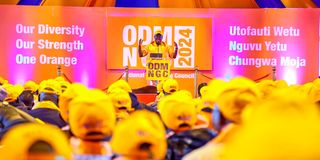Premium
Raila's ODM postpones grassroots elections due to heavy rains

ODM party leader Raila Odinga addresses the gathering during the Party's National Governing Council(NGC) 2024 at Bomas of Kenya on April 18, 2024.
Opposition leader Raila Odinga's Orange Democratic Movement (ODM) has temporarily postponed its planned grassroots elections, citing the ongoing heavy rains.
The first phase of the exercise was scheduled for Saturday (tomorrow) in Kwale, Busia and Siaya counties.
Kajiado, Migori and Wajir were to hold the exercise on Monday, April 29, with Kisii, Vihiga and Murang'a counties concluding the first phase on Tuesday, April 30.
The party's National Elections Coordinating Committee chairperson Emily Awita, in a statement to the newsroom on Friday morning, said they took the decision based on requests from some of the counties lined up for the exercise.
“The National Elections Coordinating Committee (NECC) has received requests from Busia, Siaya, Kajiado and Wajir counties where large sections of the respective counties are experiencing floods and related challenges occasioned by ongoing heavy rains for the review of its programme for the first phase of ODM grassroots elections,” said Ms Awita.
“Having reviewed the ground situation and assessed the requests, the NECC wishes to announce that the elections scheduled for 27th, 29th and 3Oth April 2024 are temporarily postponed as we assess the situation. These will resume as soon as the situation has improved,” she added.
The committee has, however, asked the country coordinating committees to continue with logistical preparations. ODM’s preparations for the grassroots election have unusually remained low key, amid reports that it could be mulling consensus as one of the methods in conducting the elections.
Use of consensus which involves an agreement by party members or delegates on who will hold what office is always deployed to a potential fallout associated with contested elections.
Party elections have in the past turned divisive and chaotic resulting in major fallouts, a scenario that has made many outfits in the country to avoid holding party elections, especially through universal suffrage.
An attempt by Mr Odinga in 2014 to hold party elections at Kasarani national stadium aborted after a group of youth dressed in black famously known as men in black stormed the venue and bungled the exercise.
It later, however, emerged that the youths were hired by some senior party officials to avert what was claimed as an attempt by some external forces to take over the party by planting their proxies in key party positions.
In Jubilee, former President Uhuru Kenyatta declined to call for party elections even as his then deputy, William Ruto, sustained pressure for party members to participate in electing officials.
The outfit that was formed in the run up to the 2017 General Elections installed interim officials with plans to have elections within three years.
But Mr Kenyatta refused to call the elections after it emerged that Dr Ruto was plotting a takeover of the party in preparation for his 2022 presidential bid.
Mr Kenyatta would later, after kicking out President Ruto’s sympathizers, hold the party National Delegates Conference (NDC) where his allies were installed in key party positions. Jeremiah Kioni was picked to replace Raphael Tuju as the party Secretary General.





